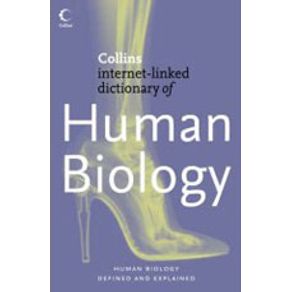Human Biology is a key subject of study in all the subjects related to medicine from radiology to pharmacology. This is the first student dictionary devoted to the subject. In over 6,000 entries, this dictionary covers the topics necessary in understanding how the human body works. There is extensive coverage of the key areas of anatomy, physiology, biochemistry, genetics and immunology, all fields with large specialised vocabularies, which are explained and where there are continuing developments in scientific knowledge that are reflected in the entries. Topics such as signs and symptoms of diseases, pathology, medical and surgical treatment, and prescription drugs, are referenced, extending the usefulness of the book. An important feature of the book is the inclusion of a considerable number of detailed key entries written in a style designed to be readily understood by those with no prior knowledge of the topics. Each of these entries gives a detailed introduction to critically important basic topics in human biology, an understanding of which is essential to the mastery of the subject: among these extended entries are Bone, Carbohydrates, Cells, Chemical elements of the body, Circulatory system, Digestive system, Diet, Enzymes, Exercise, Fats, Healing and repair, Immunity, Joints, Muscle, Proteins, Organelles, Reproductive system, Respiratory system, Skin, Skeleton and Urinary system. New students of biology and medicine are likely to find that many of their difficultiesarise from nothing more than an inadequate grasp of the basic meanings of important terms. Happily, an understanding of the meaning of a few Greek and Latin roots can cast a wide beam of enlightenment. To assist students and others this dictionary provides all the terminological elements - roots, prefixes, suffixes and combining forms - necessary to resolve such difficulties.


